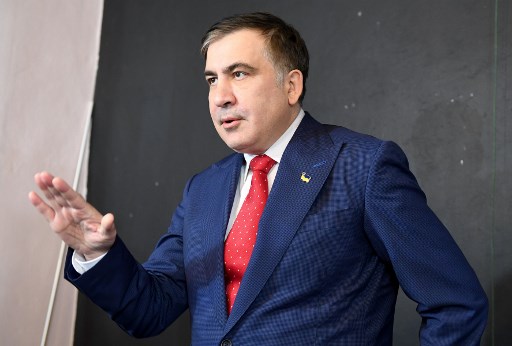
KIEV, Ukraine (AFP) – By deporting him to Poland, President Petro Poroshenko may have managed to get rid of his arch-enemy Mikheil Saakashvili for now.
But the speed and brutality of the former Georgian president and current opposition leader’s arrest and exile may damage the Ukranian government’s reformist image in the West.
Putting an end to the latest chapter of a high-profile, months-long saga, Saakashvili was arrested Monday by masked men at a restaurant in Kiev and put on a plane to Poland so quickly that his supporters did not have time to do anything about it.
On Tuesday, Saakashvili gave a press conference in Warsaw and said he had been blindfolded and rushed first by van, then by helicopter to Kiev international airport.
Saakashvili, a former governor of Ukraine’s Odessa region, was once an ally of Poroshenko, but became one of his greatest foes.
Kiev accuses Saakashvili, 50, of trying to stage a coup sponsored by allies of former Kremlin-backed Ukrainian president Viktor Yanukovych — a charge he strongly denies.
Ukraine stripped Saakashvili of his passport, but he nonetheless continued to challenge the government, organising frequent protests demanding Poroshenko’s ouster.
With the help of his supporters, he broke through the Polish-Ukrainian border in September last year, and was briefly detained in December in Kiev.
Warning to dissidents
The Ukrainian authorities “have shown the state’s strength after Saakashvili constantly showed its weakness,” sociologist Iryna Bekeshkina, head of the Kiev-based Democratic Initiatives foundation, told AFP.
For Maxim Eristavi, a research fellow at the US-based Atlantic Council think-tank, the arrest and banishment of Saakashvili serve as a “message of warning” to Poroshenko’s rivals ahead of the May 2019 presidential poll.
“Any dissenting voices will be ruthlessly squashed,” he said.
Saakashvili’s party, the Movement of New Forces, has held rallies calling for Poroshenko’s ousting and accused him of failing to fight corruption.
But it is supported by less than two percent of the population, according to a recent poll.
Poroshenko, who came to power following a pro-European revolt in 2014, is widely criticised for backsliding on reforms.
Bekeshkina said “many Ukrainians share the demands” of protests led by Saakashvili’s party.
“But Saakashvili’s personality — a flighty, unpredictable, psychologically unstable man — scares people away,” she said.
Still, the brutality of the arrest which saw border guards push Saakashvili to the ground, insulting and pulling him by the hair, according to footage posted online, has triggered strong criticism.
‘Selective justice’?
Kiev’s Western allies may also “raise questions about selective justice” in Ukraine, and the arrest could have a “negative impact” on Poroshenko’s image abroad, said Sergiy Solodkyi, deputy director of the Kiev-based New Europe think-tank.
On Tuesday, the European Commission said it continues “to follow developments regarding Saakashvili.”
“We expect the rule of law as well as the rights of Saakashvili to be upheld,” Commission spokeswoman Maja Kocijancic said.
The deportation of the former Georgian president, who officials said was residing in Ukraine illegally, “is likely being perceived as revenge” by Poroshenko, but it does not solve all his problems with Saakashvili, Bekeshkina stressed.
On Tuesday, Saakashvili said in Warsaw that he was counting on help from his supporters to return to Ukraine “to fight corruption.”
He said he planned to visit his sons in the Netherlands, and then “go on a tour of Europe” to gain political support for his cause.
“Saakashvili’s career is on a steep downward spiral,” said senior fellow at the Atlantic Council, Adrian Karatnycky.
“Still, given his energy and charisma, he cannot be counted out in the long haul.” (Agence France-Presse)








